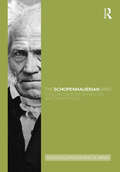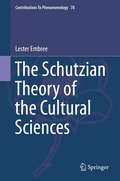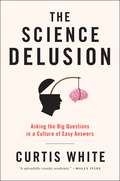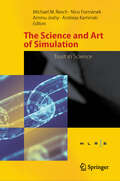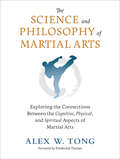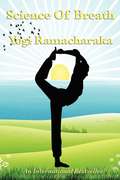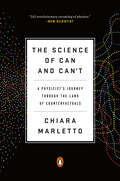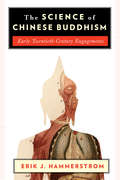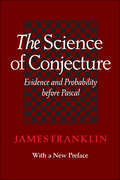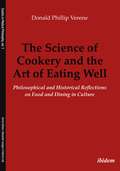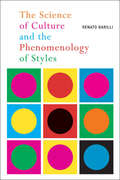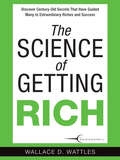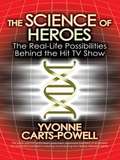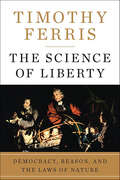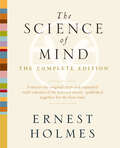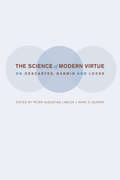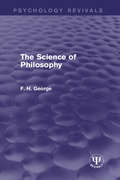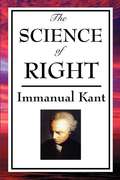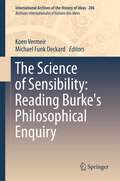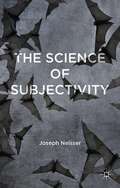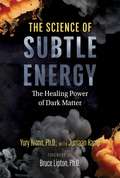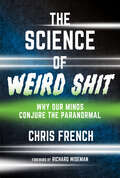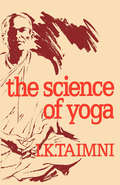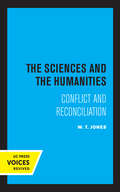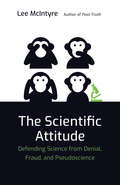- Table View
- List View
The Schopenhauerian Mind (Routledge Philosophical Minds)
by David Bather Woods and Timothy StollArthur Schopenhauer (1788-1860) is now recognised as a figure of canonical importance to the history of philosophy. Schopenhauer founded his system on a highly original interpretation of Kant’s philosophy, developing an entirely novel and controversial worldview guided centrally by his striking conception of the human will and of art and beauty. His influence extends to figures as diverse as Fredrich Nietzsche, Ludwig Wittgenstein and Iris Murdoch within philosophy, and Richard Wagner, Thomas Hardy, Sigmund Freud, Thomas Mann, Samuel Beckett and Jorge Luis Borges outside it. The Schopenhauerian Mind is an outstanding, wide-ranging collection that explores the rich nature of Schopenhauer's ideas, texts, influences, and legacy. Comprising 38 original chapters by an international team of contributors, the volume is organised into five clear parts: Knowledge and Reality Aesthetics and the Arts Ethics, Politics, and Salvation Before Schopenhauer After Schopenhauer The Schopenhauerian Mind covers all the key areas and concepts of Schopenhauer’s philosophy, including fields omitted in previous studies. It is essential reading for students of nineteenth-century philosophy, Continental philosophy and philosophy of art and aesthetics, and also of interest to those in related disciplines such as literature and religion.
The Schutzian Theory of the Cultural Sciences
by Lester EmbreeThis work is devoted to developing as well as expounding the theory of the cultural sciences of the philosopher Alfred Schutz (1899-1959). Drawing on all of Schutz's seven volumes in English, the book shows how his philosophical theory consists of the reflective clarifications of the disciplinary definitions, basic concepts, and distinctive methods of particular cultural sciences as well as their species and genus. The book first expounds Schutz's own theories of economics, jurisprudence, political science, sociology, and psychology. It then extends his approach to other disciplines, offering new theories of archaeology, ethnology, and psychotherapy in his spirit in order to stimulate the development of Schutzian theories in these and other disciplines. The second part of the book contains complementary philosophical chapters devoted to culture, groups, ideal types, interdisciplinarity, meaning, relevance, social tension, and verification.
The Science Delusion: Asking the Big Questions in a Culture of Easy Answers
by Curtis WhiteOne of our most brilliant social critics--author of the bestselling The Middle Mind--presents a scathing critique of the "delusions" of science alongside a rousing defense of the tradition of Romanticism and the "big" questions.With the rise of religion critics such as Richard Dawkins, and of pseudo-science advocates such as Malcolm Gladwell and Jonah Lehrer, you're likely to become a subject of ridicule if you wonder "Why is there something instead of nothing?" or "What is our purpose on earth?" Instead, at universities around the world, and in the general cultural milieu, we're all being taught that science can resolve all questions without the help of philosophy, politics, or the humanities. In short, the rich philosophical debates of the 19th century have been nearly totally abandoned, argues critic Curtis White. An atheist himself, White nonetheless calls this new turn "scientism"--and fears what it will do to our culture if allowed to flourish without challenge. In fact, in "scientism" White sees a new religion with many unexamined assumptions.In this brilliant multi-part critique, he aims at a TED talk by a distinguished neuroscientist in which we are told that human thought is merely the product of our "connectome," a map of neural connections in the brain that is yet to be fully understood. . . . He whips a widely respected physicist who argues that our new understanding of the origins of the universe obviates any philosophical inquiry . . . and ends with a learned defense of the tradition of Romanticism, which White believes our technology and science-obsessed world desperately needs to rediscover. It's the only way, he argues, that we can see our world clearly. . . and change it.
The Science and Art of Simulation: Trust in Science
by Michael M. Resch Andreas Kaminski Nico Formánek Ammu JoshyTrust is a central pillar of the scientific enterprise. Much work in the philosophy of science can be seen as coping with the problem of establishing trust in a certain theory, a certain model, or even science as a whole. However, trust in science is threatened by various developments. With the advent of more complex models and the increasing usage of computer methods such as machine learning and computer simulation, it seems increasingly challenging to establish trust in science. How and on what basis can an appropriate trust in science be built? We are interested in how trust is established in such cases of increasing complexity (of models and communication) and what could be appropriate measures to alleviate doubt.
The Science and Philosophy of Martial Arts: Exploring the Connections Between the Cognitive, Physical, and Spiritual Aspects of Martial Arts
by Alex W. TongThrough the lenses of Shotokan Karate and biomedicine, sensei and biomedical scientist Alex W. Tong shows readers how body, mind, and spirit can be developed through martial arts practice.Through the practice of martial arts, a person can realize their full potential--not only in body, but in mind and spirit. The Science and Philosophy of Martial Arts shows readers how. Author, sensei, and biomedical scientist Alex W. Tong delves into the physical, mental, and spiritual components of martial arts and integrates contemporary sports psychology, kinesiology, and neuroscience into a nuanced and illuminating understanding of what martial arts practice can be. Structured into three sections, Tong discusses: • The Mind: The dao of martial arts, mental tranquility, contemporary neuroscience, and warming up the brain • The Body: Posture and stance, breathing in martial arts, and the physics of mastery and effort • The Spirit: Soul, spirit, and moving zen; nature and manifestations of the spirit Each section includes observations on martial arts origins, physiology, and tangible results on martial arts training. Blending traditional and contemporary approaches, knowledge, and research, The Science and Philosophy of Martial Arts builds a vision of practice that elevates physical performance, awareness, decisiveness, and strength of spirit.
The Science of Breathing
by Yogi RamacharakaA Complete Manual of the Oriental Breathing Philosophy of Physical, Mental, Psychic and Spiritual Development - An unabridged, unaltered edition.
The Science of Can and Can't: A Physicist's Journey through the Land of Counterfactuals
by Chiara MarlettoFrom a young British scientist, a groundbreaking exploration of a radically different approach to physicsThere is a vast class of things that science has so far almost entirely neglected. They are central to the understanding of physical reality both at an everyday level and at the level of the most fundamental phenomena in physics, yet have traditionally been assumed to be impossible to incorporate into fundamental scientific explanations. They are facts not about what is (the actual) but about what could be (counterfactuals).According to physicist Chiara Marletto, laws about things being possible or impossible may generate an alternative way of providing explanations. This fascinating, far-reaching approach holds promise for revolutionizing the way fundamental physics is formulated and for providing essential tools to face existing technological challenges--from delivering the next generation of information-processing devices beyond the universal quantum computer to designing AIs. Each chapter in the book delineates how an existing vexed open problem in science can be solved by this radically different approach and it is augmented by short fictional stories that explicate the main point of the chapter. As Marletto demonstrates, contemplating what is possible can give us a more complete and hopeful picture of the physical world.
The Science of Chinese Buddhism: Early Twentieth-Century Engagements (The Sheng Yen Series in Chinese Buddhist Studies)
by Erik J. HammerstromKexue, or science, captured the Chinese imagination in the early twentieth century, promising new knowledge about the world and a dynamic path to prosperity. Chinese Buddhists embraced scientific language and ideas to carve out a place for their religion within a rapidly modernizing society. Examining dozens of previously unstudied writings from the Chinese Buddhist press, this book maps Buddhists' efforts to rethink their traditions through science in the initial decades of the twentieth century. Buddhists believed science offered an exciting, alternative route to knowledge grounded in empirical thought, much like their own. They encouraged young scholars to study subatomic and relativistic physics while still maintaining Buddhism's vital illumination of human nature and its crucial support of an ethical system rooted in radical egalitarianism. Showcasing the rich and progressive steps Chinese religious scholars took in adapting to science's rising authority, this volume offers a key perspective on how a major Eastern power transitioned to modernity in the twentieth century and how its intellectuals anticipated many of the ideas debated by scholars of science and Buddhism today.
The Science of Conjecture: Evidence and Probability before Pascal
by James FranklinHow did we make reliable predictions before Pascal and Fermat's discovery of the mathematics of probability in 1654? What methods in law, science, commerce, philosophy, and logic helped us to get at the truth in cases where certainty was not attainable? In The Science of Conjecture, James Franklin examines how judges, witch inquisitors, and juries evaluated evidence; how scientists weighed reasons for and against scientific theories; and how merchants counted shipwrecks to determine insurance rates.The Science of Conjecture provides a history of rational methods of dealing with uncertainty and explores the coming to consciousness of the human understanding of risk.
The Science of Cookery and the Art of Eating Well: Philosophical and Historical Reflections on Food and Dining in Culture (Studies In Medical Philosophy Ser. #3)
by Donald Phillip VereneThe Science of Cookery and the Art of Eating Well is a philosophical and historical reflection on food and dining in human culture. It includes discussions of the nature of the first meals as found in Greek literature and the philosophy of history of Giambattista Vico, the Roman cookbook of Apicius (the first known cookbook), the cookbook of Artusi (the seminal cookbook of Italian cooking), Brillat-Savarin’s Physiology of Taste, Plutarch’s “Dinner of the Seven Wise Men,” and Athenaeus’ work on the Learned Banqueters (the Deipnosophists). These discussions are joined with contemporary observations on the importance of the traditions of home cooking and dining with friends as essential to the promotion of human well-being.
The Science of Culture and the Phenomenology of Styles
by Renato BarilliIn The Science of Culture and the Phenomenology of Styles, Renato Barilli examines the history of artistic style in relation to scientific discovery. Applying an innovative analysis, he illustrates the subtle, yet intrinsic, connection between paradigm shifts in the sciences and in the arts. Barilli argues that there are "homologies," or equivalences, between specific discoveries or inventions and revolutionary advances in artistic techniques. He draws upon the pioneering work of Lucien Goldman, who provides the fundamental definition of "homology," as well as the theories of Luciano Anceschi and Marshall McLuhan in order to reassess conventional modes of dividing art history into such periods as modern, contemporary, and postmodern. By correlating moments like the invention of the printing press and the internal combustion engine with canonical periods in the evolution of art, Barilli unearths conceptual links across domains and disciplines. An insightful reflection on the historic perspectives of cultural production, The Science of Culture and the Phenomenology of Styles sheds new light on the relationship between visual culture, art, and language.
The Science of Getting Rich
by Wallace D. Wattles Katherine HurstBetter known as the timeless bestseller to have inspired 'The Secret' by Rhonda Byrne, this is THE original guide to creating wealth and a life you love.The Science of Getting Rich will show you how to overcome any emotional baggage or negative circumstances, to attract wealth and success - in all its form - into your life. Within the pages of this powerful book, Wattles goes directly to the source of the Law of Attraction, and in plain and easy-to-understand language, teaches you how to use it to maximum advantage. Regardless of your background or financial 'story' to date, this self-help classic will reveal to you the secrets for getting 'unstuck' from a life of wanting and lack, to unlock the incredible potential that lies within you, to create a life of unlimited abundance.This is an extraordinary book for the ordinary man or woman, looking to turn their dreams into a reality. Thousands have benefitted from the wisdom within the pages of this game-changing book, applying the lessons taught to their own lives, with astonishing effect. Are you ready to join them?
The Science of Heroes
by Yvonne Carts-PowellA fun, fact-filled examination of the science (or lack thereof) behind the hit television series Heroes. Ordinary people with extraordinary powers populate the world of the hit television show Heroes, where characters exhibit such abilities as flight, telepathy, tissue regeneration, prognostication, invisibility, and teleportation through space and time. The Science of Heroes explores these superpowers and many more through real-world research into the potential of human physical and mental capabilities. Citing the work of renowned scientists and engineers, Yvonne Carts-Powell reveals that even the least likely of powers has been studied?and in some cases, even developed. From the wonders found in nature and cutting-edge technological achievements to the latest discoveries in genetics and mutations, humanity might just possess the knowledge to achieve the extraordinary.
The Science of Liberty: Democracy, Reason, and the Laws of Nature
by Timothy Ferris“Ferris is a master analogist who conveys his insights on the history of cosmology with a lyrical flair.” —The New York Times Book ReviewIn The Science of Liberty, award-winning author Timothy Ferris—called “the best popular science writer in the English language today” by the Christian Science Monitor and “the best science writer of his generation” by the Washington Post—makes a passionate case for science as the inspiration behind the rise of liberalism and democracy. In the grand tradition of such luminaries of the field as Bill Bryson, Richard Dawkins, and Oliver Sacks—as well as his own The Whole Shebang and Coming of Age in the Milky Way—Ferris has written a brilliant chronicle of how science sparked the spread of liberal democracy and transformed today’s world.
The Science of Mind: The Definitive Edition
by Ernest Holmes"The founder of the United Church of Religious Science, an international religious movement, presents his basic spiritual tenets, showing readers how to get in touch with nature's forces and God's healing power."-Amazon.com.
The Science of Modern Virtue: On Descartes, Darwin, and Locke
by Peter Lawler Marc GuerraThe Science of Modern Virtue examines the influence that the philosopher Rene Descartes, the political theorist John Locke, and the biologist Charles Darwin have had on our modern understanding of human beings and human virtue. Written by leading thinkers from a variety of fields, the volume is a study of the complex relation between modern science and modern virtue, between a kind of modern thought and a kind of modern action. Offering more than a series of substantive introductions to Descartes', Locke's, and Darwin's accounts of who we are and the kind of virtue to which we can aspire, the book invites readers to think about the ways in which the writings of these seminal thinkers shaped the democratic and technological world in which modern human beings live. Thirteen scholars in this volume learnedly explore questions drawn from the diverse disciplines of political science, philosophy, theology, biology, and metaphysics. Let the reader be warned: The authors of these essays are anything but consensual in their analysis. Considered together, the chapters in this volume carry on a lively internal debate that mirrors theoretical modernity's ongoing discussion about the true nature of human beings and the science of virtue. Some authors powerfully argue that Locke's and Darwin's thought is amenable to the claims made about human beings and human virtue by classical philosophers such as Aristotle and classical Christian theologians such as Thomas Aquinas. Others make the opposite case, drawing attention to the ways in which Descartes, Locke, and Darwin knowingly and dialectically depart from central teachings of both classical philosophy and classical Christian theology.
The Science of Philosophy (Psychology Revivals)
by F. H. GeorgeOriginally published in 1981, this book was an attempt to bridge the gap between scientists and philosophers by viewing philosophy, at least in part, through scientific eyes. Professor George is not here concerned with the philosophy of science. Rather he is looking at classical philosophical issues from the behavioural, or scientific, viewpoint. Thus, from the perspective of science, he attempts to establish an understanding of philosophy. The author intended it primarily for behavioural scientists, systems theorists and cyberneticians of the time who should have been closely bound up with the philosophical-scientific relationship.
The Science of Right
by Immanual KantThe Science of Right has for its object the principles of all the laws which it is possible to promulgate by external legislation. Where there is such a legislation, it becomes, in actual application to it, a system of positive right and law; and he who is versed in the knowledge of this system is called a jurist or jurisconsult (jurisconsultus). A practical jurisconsult (jurisperitus), or a professional lawyer, is one who is skilled in the knowledge of positive external laws, and who can apply them to cases that may occur in experience. Such practical knowledge of positive right, and law, may be regarded as belonging to jurisprudence (jurisprudentia) in the original sense of the term.
The Science of Sensibility: Reading Burke's Philosophical Enquiry
by Koen Vermeir Michael Funk DeckardAttracting philosophers, politicians, artists as well as the educated reader, Edmund Burke's Philosophical Enquiry, first published in 1757, was a milestone in western thinking. This edited volume will take the 250th anniversary of the Philosophical Enquiry as an occasion to reassess Burke's prominence in the history of ideas. Situated on the threshold between early modern philosophy and the Enlightenment, Burke's oeuvre combines reflections on aesthetics, politics and the sciences. This collection is the first book length work devoted primarily to Burke's Philosophical Enquiry in both its historical context and for its contemporary relevance. It will establish the fact that the Enquiry is an important philosophical and literary work in its own right.
The Science of Subjectivity
by Joseph NeisserCan neuroscience help explain the first-person perspective? The Science of Subjectivity delves into the nature of experience, arguing that unconscious subjectivity is a reality. Neisser identifies the biological roots of the first-person, showing how ancient systems of animal navigation enable creatures like us to cope with our worldly concerns.
The Science of Subtle Energy: The Healing Power of Dark Matter
by Yury Kronn• Shares the results of the author&’s rigorous, repeatable, and predictable experiments with subtle energy • Shows how the mind interacts with matter by means of subtle energy--the key to the placebo effect, the healing power of affirmations and prayers, and energy medicine • Demonstrates how to harness subtle energy and explains the author&’s technology to generate subtle energy formulations with practical applications Instruments of modern physics can measure the energies of the electromagnetic spectrum, but these energies only account for roughly 4 percent of the total identifiable mass-energy of the universe. What makes up the remaining 96%? In this scientifically-based yet accessible analysis, Yury Kronn, Ph.D., explores the nature of the remaining 96% of the universe&’s mass-energies. Contemporary science calls this mass-energy &“dark matter,&” and the ancients called it life force, prana, or chi. Dr. Kronn shows how this subtle energy belongs to the subatomic world and how it follows laws that are fundamentally different from those known to contemporary science. Sharing the results of his rigorous, repeatable, and predictable experiments with subtle energy, the author looks at the possible mechanisms of subtle energy&’s interaction with physical matter and with the human body. He shows how the mind interacts with matter by means of subtle energy--giving us the key to understanding the placebo effect and extrasensory perception as well as the healing power of affirmations, and energy medicine. Dr. Kronn demonstrates how it&’s possible to harness subtle energy and explains his development of Vital Force Technology, which integrates ancient knowledge of the life force with modern technology to generate specific subtle energy formulations for practical applications. He presents his experimental results creating subtle energy formulas to positively influence the germination of seeds and the growth of plants. He also demonstrates the possibility of using subtle energy for creating clean and energetic-pollution-free environments for vitality and better healing. Outlining the many benefits of subtle energy technology to individuals, societies, and the planet as a whole, Dr. Kronn reveals how the transformative power of subtle energy arises from the vast potential of human consciousness.
The Science of Weird Shit: Why Our Minds Conjure the Paranormal
by Chris FrenchAn accessible and gratifying introduction to the world of paranormal beliefs and bizarre experiences.Ghostly encounters, alien abduction, reincarnation, talking to the dead, UFO sightings, inexplicable coincidences, out-of-body and near-death experiences. Are these legitimate phenomena? If not, then how should we go about understanding them? In this fascinating book, Chris French investigates paranormal claims to discover what lurks behind this &“weird shit.&” French provides authoritative evidence-based explanations for a wide range of superficially mysterious phenomena, and then goes further to draw out lessons with wider applications to many other aspects of modern society where critical thinking is urgently needed.Using academic, comprehensive, logical, and, at times, mathematical approaches, The Science of Weird Shit convincingly debunks ESP, communicating with the dead, and alien abduction claims, among other phenomena. All the while, however, French maintains that our belief in such phenomena is neither ridiculous nor trivial; if anything, such claims can tell us a great deal about the human mind if we pay them the attention they are due. Filled with light-bulb moments and a healthy dose of levity, The Science of Weird Shit is a clever, memorable, and gratifying read you won&’t soon forget.
The Sciences and the Humanities: Conflict and Reconciliation
by W. T. JonesThis title is part of UC Press's Voices Revived program, which commemorates University of California Press’s mission to seek out and cultivate the brightest minds and give them voice, reach, and impact. Drawing on a backlist dating to 1893, Voices Revived makes high-quality, peer-reviewed scholarship accessible once again using print-on-demand technology. This title was originally published in 1965.
The Scientific Attitude: Defending Science from Denial, Fraud, and Pseudoscience (The\mit Press Ser.)
by Lee McIntyreAn argument that what makes science distinctive is its emphasis on evidence and scientists' willingness to change theories on the basis of new evidence.Attacks on science have become commonplace. Claims that climate change isn't settled science, that evolution is “only a theory,” and that scientists are conspiring to keep the truth about vaccines from the public are staples of some politicians' rhetorical repertoire. Defenders of science often point to its discoveries (penicillin! relativity!) without explaining exactly why scientific claims are superior. In this book, Lee McIntyre argues that what distinguishes science from its rivals is what he calls “the scientific attitude”—caring about evidence and being willing to change theories on the basis of new evidence. The history of science is littered with theories that were scientific but turned out to be wrong; the scientific attitude reveals why even a failed theory can help us to understand what is special about science. McIntyre offers examples that illustrate both scientific success (a reduction in childbed fever in the nineteenth century) and failure (the flawed “discovery” of cold fusion in the twentieth century). He describes the transformation of medicine from a practice based largely on hunches into a science based on evidence; considers scientific fraud; examines the positions of ideology-driven denialists, pseudoscientists, and “skeptics” who reject scientific findings; and argues that social science, no less than natural science, should embrace the scientific attitude. McIntyre argues that the scientific attitude—the grounding of science in evidence—offers a uniquely powerful tool in the defense of science.
